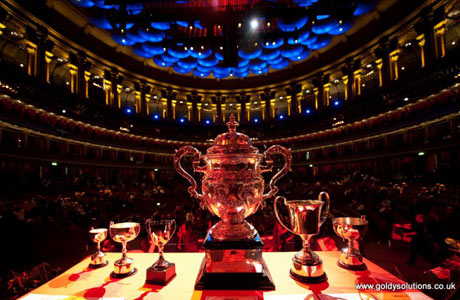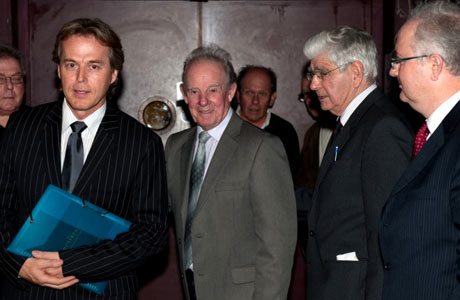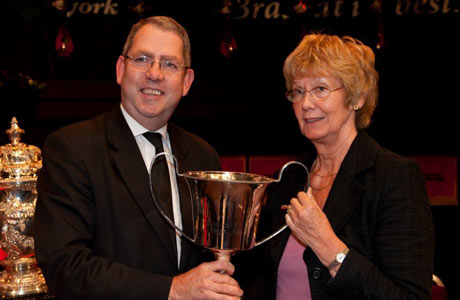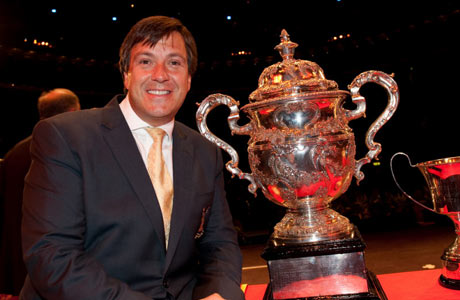2009 National Championships of Great Britain - Postcard from Kensington
20-Oct-2009Like Lot's wife, the Nationals can't afford to look back over it's shoulder too often...

The biggest prize of all: The trophies stand in waiting at the Albert Hall
Picture: Ian Clowes
More National pictures can be found at:
http://www.pbase.com/troonly/09_london_finals
If the Nationals carry on like this then there may well be a sustainable future for the contest at London’s premier contest venue.
More bums on seats
A combination of a populist test piece, a decent line up of bands and slick organisation gave the event a well timed boost this year.
The old cake tin is a long way off having to put the ‘Full House’ signs up yet, but it was noticeable that there were more bums on seats this year from last, and that they sat there for longer to listen to more of the competitors too.
It is a fragile balancing act though.
Forward momentum
There is only so much forward momentum that can be created by looking to squeeze inspiration from the past – from the format of the day to the music that is played.
Kapitol Promotions has done a fine job in the last couple of years both here and in Harrogate, but they must know that the underlying problem remains with the structure of getting bands to the Finals themselves.
The next step is surely to reorganise the sections to reflect quality rather than quantity, as despite the outward appearance of good health created at both venues the movement continues to haemorrhage regional competitors at an ever increasing rate.
If that particular nettle can be grasped then to borrow a well worn phrase, those ‘green shoots of recovery’ that are breaking through can be nurtured further.

Line up of judges: The judges wait their turn on stage
Picture: Ian Clowes
Too many
20 bands at the Royal Albert Hall are still too many. The idea of reducing the number to 16 (the top 8 bands re-qualify plus the 8 regional winners each year), and having a later starting time remains persuasive.
People we talked to thought the fact that the contest day was over at a time that allowed them to enjoy a London at night was great news, but that was balanced by the fact that they also wanted to hear better bands too. Changing the format of qualification may well help.
Hit and hope
As for the choice of test pieces?
As Howard Snell proposed some years ago now, having a clearly defined rotation of choices of genre is now overdue. Peter Graham’s test piece was a very popular choice - after people heard it on the day.
The current policy is still ‘hit and hope’. One less populist choice could set back all the good work of the past few years.
The opportunity is available to get the choice of composer and of the inspiration for the piece out to the public as far in advance as possible. It would surely help.
Winner
Peter Graham’s ‘The Torchbearer’ was a winner with the listeners, although it is doubtful that it will be played as often in competition as some claimed in the aftermath of the contest.
The thought also occurred that it is about time a halt was called on relying on the compositional past to help sustain the musical future at major events.
A cynic may suggest that if it carries on at this rate the organisers could well be asking Paul Lovatt-Cooper to write his version of ‘Variations on a Theme of Gems from Sullivan’s Operas arranged by Ord Hume, transcribed by William Rimmer in an academic realisation by Peter Graham’ for 2015.

Whitham memories: Joyce Skidmore presents Black Dyke with the trophy
Picture: Ian Clowes
Name change
Even this piece had a bit of a name change – although it still holds the record for the longest name for a test piece used at the Finals. The initial announcement made by the organisers had it down as ‘The Torchbearer – Symphonic Variations and Metamorphosis on a Theme by Eric Ball’ but something had to give before the printers ran out of ink.
Adjudicator David Read told 4BR that people like good tunes and there is no denying that – but they also like original ones too.
As for ‘Torchbearer’ – what does its immediate future hold? Can anyone see any point in picking it for a regional contest (other than people whistling the tunes on the way home), when on the evidence of Saturday only four bands really came close to mastering it? Perhaps it would enable the best bands to get through – but at what cost?
Hopefully, less than that of the study score.
That seemed to be priced (£10.00) with the thought of ensuring that the person selling it wouldn’t have to carry a pocket full of change around with them.
Combination
A combination of programme/study score for the same price would be better value for money and not illicit the thought that someone was making a very nice return out of its sale (plus it wasn’t updated to reflect the list of errata either). A day out in London is expensive, but that seemed a tad excessive to say the least.
That though was perhaps the only minor non musical gripe of the day.

Five times a winner: Nicholas Childs and his prize
Picture: Ian Clowes
First rate
The organisation here is now first rate – (a pre draw may still help the bands with trying to organise contest rehearsal facilities) and it was noticeable just how quick the competitors were on and off the stage this year.
Peter Bates was excellent as compere, keeping interest and spirits up and making a fine fist of the results announcement (no return to the past we hope for Sheila Tracey) although the fanfare trumpets from the Royal Marines could have been utilised a bit more.
There was also a nice touch in inviting Jean Skidmore (Geoff Whitham’s partner) to the stage and the way in which the audience greeted the composer himself too, despite his late arrival!
Written before
Cory provided a very professional pre-results musical interlude, although David Read’s short analysis of the adjudicator’s thoughts did smack of possibly being written at some stage other than after listening to all the bands.
It takes some doing to come up with the phrase; “We, the adjudicators, David, Derek and myself, wanted to hear performances that integrated the ‘oneness’ of the musical score and the innate nature of Eric Ball’s musical language.” It was welcome though, and appreciated.
The three men in the box must have enjoyed themselves – although it would have been interesting to know more about the process that separated out some of the minor placings.
There were a few contentious ones in there to keep those conspiracy theorists going…
Neat summing up
David Read’s remarks rather neatly summed up the day though. As he said: “It has been suggested in recent years that the art of playing Eric Ball’s music has been lost in modern banding. However, thankfully we have heard numerous performances today that proved otherwise.”
The Nationals is moving forward with its sights set on the future. It can perhaps do without so many yearning glances over its shoulder in the years to come though.
Iwan Fox















